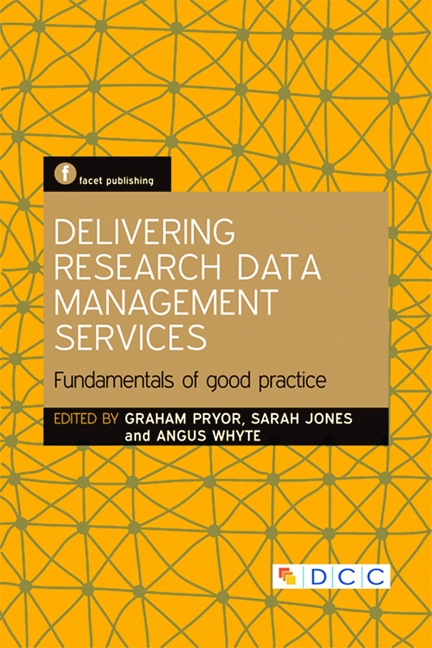Book contents
- Frontmatter
- Contents
- Preface
- Contributors
- 1 A patchwork of change
- 2 Options and approaches to RDM service provision
- 3 Who's doing data? A spectrum of roles, responsibilities and competences
- 4 A pathway to sustainable research data services: from scoping to sustainability
- 5 The range and components of RDM infrastructure and services
- 6 Case study 1: Johns Hopkins University Data Management Services
- 7 Case study 2: University of Southampton – a partnership approach to research data management
- 8 Case study 3: Monash University, a strategic approach
- 9 Case study 4: a national solution – the UK Data Service
- 10 Case study 5: development of institutional RDM services by projects in the Jisc Managing Research Data programmes
- Index
10 - Case study 5: development of institutional RDM services by projects in the Jisc Managing Research Data programmes
Published online by Cambridge University Press: 08 June 2018
- Frontmatter
- Contents
- Preface
- Contributors
- 1 A patchwork of change
- 2 Options and approaches to RDM service provision
- 3 Who's doing data? A spectrum of roles, responsibilities and competences
- 4 A pathway to sustainable research data services: from scoping to sustainability
- 5 The range and components of RDM infrastructure and services
- 6 Case study 1: Johns Hopkins University Data Management Services
- 7 Case study 2: University of Southampton – a partnership approach to research data management
- 8 Case study 3: Monash University, a strategic approach
- 9 Case study 4: a national solution – the UK Data Service
- 10 Case study 5: development of institutional RDM services by projects in the Jisc Managing Research Data programmes
- Index
Summary
Introduction
This chapter offers a preliminary overview of the development of research data management (RDM) services by projects in the second Jisc Managing Research Data (MRD) programme, which ran between 2011 and 2013. Reference is also made to the first MRD programme and projects within this, where appropriate. The second MRD programme encouraged projects to adopt a coherent approach, to share ideas and resources at an early stage and to look to the Digital Curation Centre (DCC) for guidance. Therefore, it is hoped that details of how the programme was designed and managed, and the approaches emerging from the projects, will be of interest. It should be stressed, however, that only a few of the projects have been completed at the time of writing, and so the detail of RDM services developed and conclusions about effective approaches can only be partial.
The data management impetus
The good management of research data is not, of course, an end in itself but is commonly perceived as an essential component of good research practice. An increasingly vocal community of researchers considers making research data easily available for verification and reuse to be an essential component of good scientific practice. Indeed, Geoffrey Boulton argued in his keynote at the MRD workshop in March 2013 that publishing research findings without simultaneously making the underlying data (in other words, evidence) available amounts to malpractice. Where data are the product or record of unrepeatable observations, sound data management, curation and longterm preservation strategies become imperative.
Meanwhile, certain research disciplines are becoming increasingly ‘datacentric’ and the creation, sharing and reuse of data are a core focus of activity. Some disciplines have been revolutionized by the community adoption of open data principles. The innovative and transforming potential of data reuse, recombinations or ‘mashups’ – for example those combining data with geospatial location components – is a growing source of interest and is generating palpable excitement both within and beyond the academy.
- Type
- Chapter
- Information
- Delivering Research Data Management ServicesFundamentals of Good Practice, pp. 205 - 238Publisher: FacetPrint publication year: 2013
- 2
- Cited by



